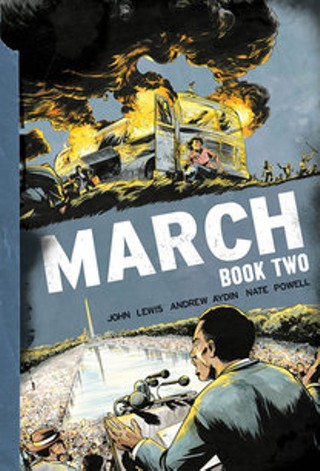Lit-urday: Civil Rights Are Always Timely
Graphic novel talks Freedom Rides and a shout-out to UT
By Jessi Cape, 11:00AM, Sat. Jan. 31, 2015

It's been a long week, and now you deserve to have one day when you can curl up with a good book – let's call it Lit-urday. Perhaps the release of Selma and recent celebration of Martin Luther King Jr.'s birthday have you hungering to know more about the civil rights movement.
March: Book Two
by John Lewis and Andrew Aydin, illustrated by Nate Powell
Top Shelf Publishers, 187pp., $19.95
Last week, Congressman John Lewis tweeted, “Reading is a liberating force. Reading will free your spirit. Reading can help you grow, help you understand this little planet. #timetoread.” The second installment of his graphic novel trilogy was released January 21, and it’s 60 pages longer and more emotionally riveting than the first. March: Book Two takes readers on an illustrated journey from the Freedom Rides of 1961 through the 1963 March on Washington for Jobs and Freedom.
Civil rights work is always relevant, but with a new crop of national protests birthed from the events in Ferguson, Mo., and the December release of Ava DuVernay’s new feature film, Selma, the timing is remarkable. March: Book Two picks up where the #1 New York Times bestselling first book left off, and explains the precursory events to the march from Selma to Washington - an event nearing its 50th anniversary. Reportedly inspired by a 1957 comic Martin Luther King and the Montgomery Story (recently re-released by Top Shelf Productions), Lewis continues to narrate the story, with co-author Congressional Aide Andrew Aydin and famed illustrator Nate Powell (Swallow Me Whole), in hopes of telling the movement’s story to a new generation. As Lewis witnesses the 2009 inauguration of President Obama, he flashes back to the Movement's early days, and Powell's black-and-white drawings convey the powerful events in a manner that completely envelops the reader.
From the graphic novel’s speech bubbles depicting Lewis’ speech at the March on Washington: “We do not want our freedom gradually, but we want to be free now! We are tired. We are tired of being beaten by policemen. We are tired of seeing our people locked up in jail over and over again. … But we will go to jail if this is the price we must pay for love, brotherhood, and true peace …. We must say ‘Wake Up America! Wake up!’ For we cannot stop, and we will not and cannot be patient.”
And Austin gets a shout-out: The 1961 movie theatre stand-ins of Nashville, Tenn., were inspired by the tactics employed by the University of Texas students and citizens who protested to desegregate the Drag’s popular theatres, an act of nonviolent protest praised at length by Eleanor Roosevelt in her national newspaper column. (This link has the full story, and some fantastic pictures.)
The book follows the involvement of many of the key players, such as Dr. King and both JFK and Robert Kennedy, and introduces the reader to names less familiar - Bayard Rustin and Diane Nash. Particularly interesting are the squabbles regarding tactics between groups - namely the SNCC, SCLC, and CORE - and the activists’ many trips to jail and reasons for refusing to post bail.
From the scraps of paper smuggled from Dr. King’s jail cell, that comprise the “Letter from Birmingham Jail”: “I submit that an individual who breaks a law that conscience tells him is unjust, and who willingly accepts the penalty of imprisonment in order to arouse the conscience of the community over its injustice, is in reality expressing the highest respect for law.”
Lewis’ recollection of the pain of the violence directed at the Freedom Riders is palpable, the determination of the movement even more so: “The fare was paid in blood, but the Freedom Rides stirred the national consciousness and awoke the hearts and minds of a generation.” The book never wavers, yet somehow relates the historical events in a manner appropriate for use as a teaching aide. Even the tragedy of Bull Connor’s mass arrests and fire hoses and dogs - unleashed on children in May 1963, in Birmingham, Ala. - and Medgar Evers’ assassination, are handled with a steady voice, and conscientious pen.
The book literally ends with an explosion, a telltale sign that the trilogy’s final book, March: Book Three will be a powerful testament to the hard work of all who fight for freedom.
A note to readers: Bold and uncensored, The Austin Chronicle has been Austin’s independent news source for over 40 years, expressing the community’s political and environmental concerns and supporting its active cultural scene. Now more than ever, we need your support to continue supplying Austin with independent, free press. If real news is important to you, please consider making a donation of $5, $10 or whatever you can afford, to help keep our journalism on stands.
April 12, 2024
March 14, 2024
Congressman John Lewis, Freedom Rides, Dr. Martin Luther King, Selma, March on Washington, Kennedy, University of Texas, Eleanor Roosevelt








